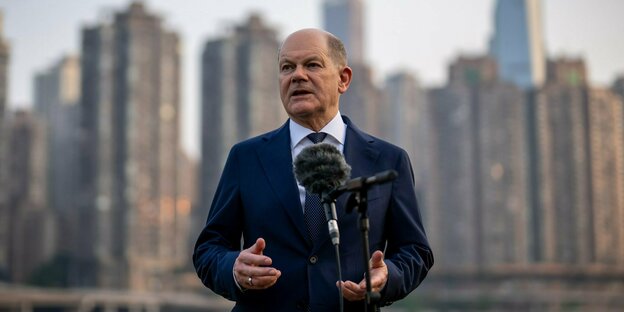Following Iranian attacks on Israel, Scholz calls for an end to escalation. But how? The traffic lights demand tougher treatment of Tehran.

In Chongqing, China, Chancellor Olaf Scholz warns of further escalation after Iranian attacks Photo: Michael Kappeler, dpa
SEDAN taz | Olaf Scholz spoke Sunday afternoon from Chongqing, where he landed early in the morning for his three-day trip to China. Iran's nighttime rocket and drone attacks against Israel are “an unforgivable attack,” explains the German Chancellor. “This is a terrible escalation of the situation and is in no way acceptable, understandable or acceptable.” And Scholz is not the only one in German politics who utters these words.
Iran fired 300 rockets, drones and cruise missiles at Israel overnight. It was Iran's first direct attack against Israel. Damage remained manageable, mainly thanks to Israeli air defense. But there was great international outrage, including Germany. That morning, Scholz had already criticized the attacks, calling them “unjustifiable.” Iran risks a “conflagration.”
At lunchtime Scholz will be in Chongqing, where he will travel with a German business delegation. Scholz clearly warns Iran and its allies against further escalation. Israel has every right to defend itself, the Chancellor emphasizes. But ultimately she also appeals to “all” actors in the region, including the Netanyahu government in Israel, which has already announced reactions. He could only warn everyone to “keep it up,” Scholz said.
Scholz himself modified his visit program to China for Sunday and canceled his participation in an afternoon boat trip. Instead, the Chancellor wanted to participate in a conference of the G7 heads of government on the Iran attacks. In the evening she also wanted to meet again with the federal government ministers responsible for security.
The federal government's crisis team met
The federal government's crisis team had already met on Sunday morning for almost an hour, led by Foreign Minister Annalena Baerbock. Scholz was involved. “The Iranian regime has clearly brought the entire Near and Middle East to the brink,” Baerbock later explained. The attacks must be condemned “in the strongest possible terms” and Israel deserves Germany’s “full solidarity.”
Baerbock calls on Iran to refrain from further attacks, including through its allies. A regional conflagration would have “incalculable consequences.” But the Minister of Foreign Affairs also calls on “all actors in the region” to act with caution. “We must break the spiral of escalation.” We must find an end to violence “together.”
The only question remains: how exactly can this be achieved? What consequences will Germany now also be involved in for Iran? And how will Germany support Israel in the event of further escalation?
Scholz and Baerbock left the answers to this open for the moment. Scholz and Baerbock simply explained that the consequences are being discussed with international partners. However, Germany has long been criticized for being too lenient towards Iran, for example by not pushing for the Iranian Revolutionary Guard to be placed on the EU's terrorist list.
Demands for a “harder pace”
On Sunday, loud voices were also heard at the traffic lights calling for a tougher attitude towards Iran. Michael Roth (SPD), chairman of the Bundestag Foreign Affairs Committee, said the EU and Germany must “finally adopt a tougher attitude towards Iran”. The mullahs' regime is destabilizing and radicalizing the entire Middle East.
FDP European leader Marie-Agnes Strack-Zimmermann said the Iranian attacks “dramatically show the failure of the naive appeasement policies that the mullahs' regime is now using.” Germany and the EU must do everything possible to help Israel defend itself.
Foreign expert Jürgen Hardt (CDU) also demanded in the opposition that the West “must finally take a tough stance against Tehran.” The mullahs' regime has finally shown that it represents “chaos, violence and terror.” His party colleague Norbert Röttgen also argued that the federal government must ensure that the EU corrects its “disastrous policy towards Iran.” Germany must limit its trade relations with Iran and can no longer be the most important partner here. And the Revolutionary Guards belong to the EU terrorist list, Röttgen said.
German ambassador summoned
But Iran reacted first. On Sunday, it suspended the ambassadors of Germany, Britain and France in Tehran for their “irresponsible” reactions to the Iranian attacks. The mullahs' government had described the drone and missile attacks as retaliation for an airstrike on the Iranian embassy compound in the Syrian capital, Damascus, in April. At that time two brigadier generals and five other members of the Revolutionary Guard were murdered. Initially, Germany did not react to the hiring of the ambassador.
The embassy and Foreign Ministry had previously called on all Germans to leave Iran “immediately”, due to the current security situation, which could “deteriorate further without warning and quickly”. Baerbock stressed on Sunday that this warning must be “taken very seriously.”